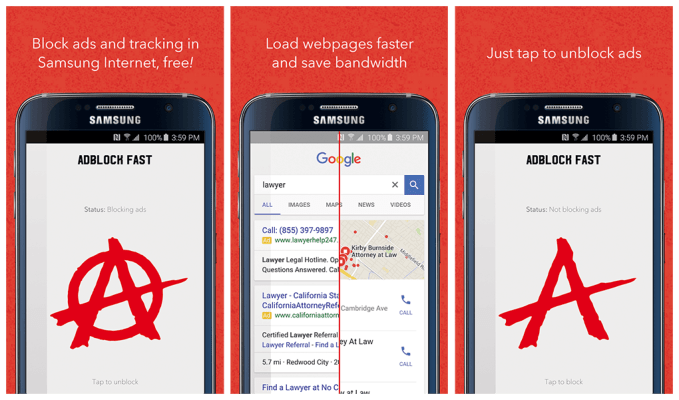With the release of iOS 9 last year, Apple introduced support for ad blocking within its Safari web browser.

within its Safari web browser. On Sunday, smartphone maker Samsung debuted its own support for content and ad blocking in the default web browser installed on its Android smartphones. The update, which is rolling out now to devices running Android Lollipop or higher, works in a similar way as ad blocking on Apple’s iOS 9.
That is, it allows third-party developers the ability to build apps that that will block distracting and intrusive ads on the mobile web, as well as strip out extra content from web pages, allowing them to load faster and consume less data.
These apps are made possible by way of Samsung’s new Content Blocker extension APIarriving in the latest version of the Samsung Internet Browser. That means Samsung owners will have to be using the company’s own browser, not a third-party browser like Google Chrome, in order to take advantage of the new functionality.
That’s still a massive potential audience for the technology, however – the Google Play Store reportsthe Samsung browser has over 10 million (but under 50 million) downloads. And this is only those who have sought it out – the app is pre-installed on Samsung devices.
However, unlike on iOS where Safari dominates – Net Applications‘ data indicates that Safari has over 34 percent of the mobile browser market – on Android phones, Google’s Chrome is still the top choice. It has a 41.57 percent share of the total market, thanks to its ties with Google’s Android OS.
The addition of the content blocking API makes Samsung the first major Android smartphone maker to introduce ad blocking, after Apple’s ground-shaking announcement that soon saw ad blockers climbing to the top of the App Store charts,and had web publishers concerned about the impacts to their bottom lines.
That being said, the fervor around ad blocking has died down in recent weeks, but consumers’ dissatisfaction with the mobile web and its ad-crammed pages has not. Other initiatives are also underway that take a different angle on making the web more usable on mobile devices, including Google’s sped-up, mobile-friendly websites built by way of its AMP Project. Meanwhile, Facebook now offers “Instant Articles” on its social network, which are said to load up as much as 10 times faster than the mobile web.

Soon after Samsung’s announcement, ad blocker makers launched versions of their apps for supported Samsung phones. This includes Crystaland Adblock Fast, which were among the first out of the gate. The latter claims over 200,000 users for its app that’s also live on Chrome, Opera and Safari. It offers seven optimized filtering rules which make websites run, on average, 51 percent faster, the company says.
Crystal offers a similar filter list, and blocks tracking technology, malware and social networking annoyances, while also offering users the ability to support sites that conform to the Acceptable Adscriteria by allowing non-intrusive advertising.
Expect more to follow. The question now will be whether or not Samsung owners will rush to install these applications, as the iOS audience once did. Even if they don’t show up in droves, the move by Samsung, which had a 22.2 percent shareof the smartphone market in 2015, could see other Android smartphone makers doing the same, as the tech could be seen as a competitive advantage.
The longer-term impact, in that case, would hopefully be a web publishing ecosystem that offers more respect for website visitors’ time and attention.